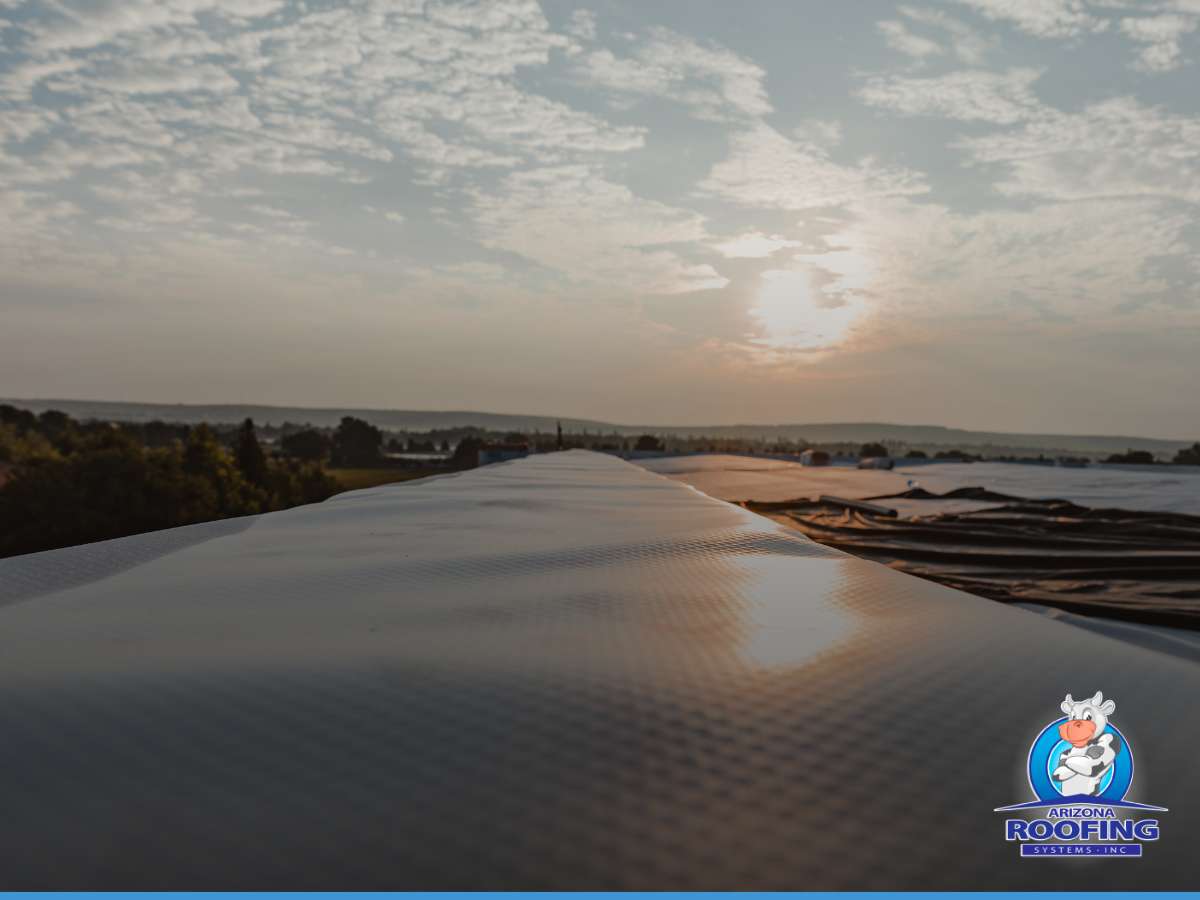Enhancing Roof Performance: Navigating TPO & PVC Roofing Options For Businesses
There are many roofing materials to choose from when you are ready to roof your home or business. Most people are familiar with shingle, tile, or metal roofing, each with their own unique benefits. These materials are fantastic for a variety of uses. However, there are two lesser known materials that are equally as advantageous as roofing materials.
The two lesser known materials are TPO and PVC roofing which are both fantastic choices for homes and businesses. They each have distinctions which makes understanding what they are, how they work, and what their differences are, crucial.

Exploring TPO Roofing: Benefits, Installation & Suitability For Your Roof
TPO or Thermoplastic Olefin is made from a blend of polypropylene and ethylene-propylene rubber and it’s typically reinforced with polyester for added strength. TPO roofing membranes are often white or light-colored to enhance reflective capabilities and they are most often used for commercial buildings. However, it also works for residential buildings.
TPO membranes come in large rolls that are rolled out onto a prepared roofing surface. Mesa roofing contractors install the membranes using screws and plates along the edges or they glue directly to the roofing deck. From there, the membranes are typically heat-welded at the seams to create a watertight bond.
Advantages Of TPO Roofing For Energy Efficiency & Durability
TPO roofing has gained popularity in the construction industry in recent years. The material boasts a wide variety of benefits from durability to cost-effectiveness to being environmentally friendly. Some of the many benefits of TPO roofing include:
- Energy Efficient: TPO roofing is highly reflective which helps in reducing heat absorption and lowering cooling costs for buildings.
- Durability: TPO membranes are resistant to UV radiation, chemicals, and punctures, providing a durable and long-lasting roofing solution.
- Flexibility Of Installation: Mesa Roofing Contractors can install TPO roofing using various methods, allowing for flexibility in installation based on the building’s needs.
- Cost-Effective: TPO roofing is often considered cost-effective due to its relatively lower material costs, ease of installation, and potential energy savings over time.
- Environmentally Friendly: TPO roofing is a recyclable material, making it an environmentally friendly choice. Additionally, its reflective properties contribute to reducing the urban heat island effect.
- Easy To Maintain: Regular inspections and simple cleaning are usually sufficient to keep your TPO roof in good condition.
- Versatility: TPO roofing is suitable for various roof designs, including flat or low-slope roofs. It can be used in new constructions or as a replacement for existing roof systems.
- Lightweight: TPO roofing is relatively lightweight compared to some other roofing materials, reducing the structural load on the building.
Exploring PVC Roofing: Composition & Uses For Homes & Businesses
PVC or Polyvinyl chloride roofing is made from a type of synthetic plastic polymer. PVC roofing membranes reinforced with polyester or fiberglass for added strength and stability. It is commonly used for low-slope or flat roofs in commercial and industrial buildings, but like TPO, can also be used for homes.
PVC membranes, like TPO, come in rolls which are rolled out onto a prepared roofing surface. They are attached to the roof just like TPO, with screws and plates or glue. They are also welded at the seams creating a watertight bond and enhancing the roof’s overall integrity.
Key Benefits Of Choosing PVC Roofing: Durability, Energy Efficiency & More
There are many benefits to PVC roofing, but like any material, proper installation by Mesa roofing contractors is crucial for the long-term performance of the PVC roofing system. Some of the incredible benefits include:
- Durability: PVC roofing is highly durable and resistant to weathering, chemicals, and UV radiation, making it a long-lasting roofing solution.
- Waterproofing: PVC roofing provides excellent waterproofing capabilities due to its heat-welded seams, reducing the risk of water infiltration and leaks.
- Energy Efficiency: The reflective properties of PVC roofing help to reduce heat absorption, contributing to energy efficiency by lowering cooling costs for buildings.
- Chemical Resistance: PVC is resistant to various chemicals, including acids and oils, making it suitable for installations in industrial settings where exposure to such substances is common.
- Flexibility & Movement: PVC roofing is known for its flexibility, allowing it to accommodate building movement without cracking or breaking.
- Low Maintenance: PVC roofing requires minimal maintenance. Regular inspections and occasional cleaning are usually sufficient to keep the roof in good condition.
- Lightweight: PVC roofing is relatively lightweight, reducing the structural load on the building.
- Recyclability: PVC is recyclable, making it an environmentally friendly roofing option.
- Fire Resistance: PVC roofing systems often meet or exceed building code requirements, providing assurance of compliance with local regulations.
Comparing TPO & PVC Roofing: Which Is The Right Choice For Your Project?
When choosing between TPO and PVC roofing materials, there are several differences you need to take into account. While they are very similar, which material you choose depends on your specific needs, budget, and preferences. Here are some things you should consider before deciding on which material your roofing contractor will install.
- Cost: TPO tends to be more cost-effective compared to PVC due to the cost of the PVC material and how it is made.
- Chemical Resistance: TPO is resistant to many chemicals, but may not be as chemical-resistant as PVC.
- Environmental Impact: While PVC is recyclable, its production involves chlorine, and there are other environmental concerns associated with its manufacturing process, unlike TPO.
If you’re unsure on which material to install on your roof, consider if cost is a concern as TPO may be more economical. If you’re worried about chemical resistance, PVC might be more suitable. Ultimately, it is wise to consult with a Mesa roofing contractor to help determine which material might be best for you!
For High-Quality Roofing Installations, Consider Our Roofing Contractors!
Rely on our experienced roofing contractors who bring expertise and professionalism to every project! Our skilled team at Arizona Roofing Systems ensures high-quality workmanship, using premium TPO and PVC materials and following industry best practices.
When you’re ready to install TPO or PVC on your roof, contact us!
ARIZONA ROOFING SYSTEMS
935 E. Sorenson
Mesa, AZ 85203
Tel: 480-218-8888
Email: [email protected]
Website: www.azroofingsystems.com
